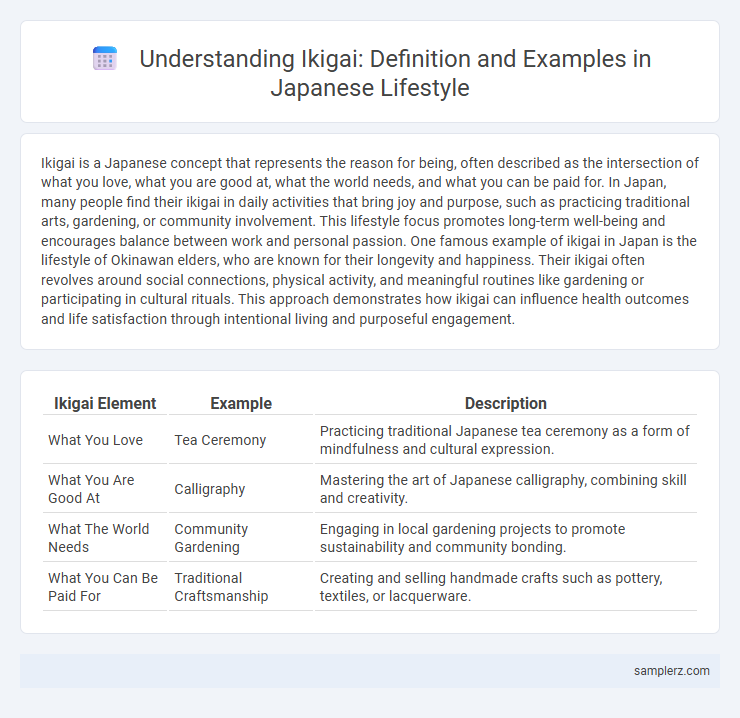Ikigai is a Japanese concept that represents the reason for being, often described as the intersection of what you love, what you are good at, what the world needs, and what you can be paid for. In Japan, many people find their ikigai in daily activities that bring joy and purpose, such as practicing traditional arts, gardening, or community involvement. This lifestyle focus promotes long-term well-being and encourages balance between work and personal passion. One famous example of ikigai in Japan is the lifestyle of Okinawan elders, who are known for their longevity and happiness. Their ikigai often revolves around social connections, physical activity, and meaningful routines like gardening or participating in cultural rituals. This approach demonstrates how ikigai can influence health outcomes and life satisfaction through intentional living and purposeful engagement.
Table of Comparison
| Ikigai Element | Example | Description |
|---|---|---|
| What You Love | Tea Ceremony | Practicing traditional Japanese tea ceremony as a form of mindfulness and cultural expression. |
| What You Are Good At | Calligraphy | Mastering the art of Japanese calligraphy, combining skill and creativity. |
| What The World Needs | Community Gardening | Engaging in local gardening projects to promote sustainability and community bonding. |
| What You Can Be Paid For | Traditional Craftsmanship | Creating and selling handmade crafts such as pottery, textiles, or lacquerware. |
Discovering Ikigai: Everyday Practices in Japanese Life
Many Japanese people find ikigai through daily rituals such as morning tea, mindful gardening, and community engagement, which foster a sense of purpose and well-being. Embracing simplicity and connection, these everyday practices align personal values with routine actions, promoting long-term happiness. This cultural framework encourages balancing work, family, and personal passions, reinforcing ikigai as an integral part of Japanese lifestyle.
Ikigai and Traditional Japanese Arts: Tea Ceremony and Calligraphy
Ikigai in Japan is deeply connected to traditional arts such as the tea ceremony and calligraphy, which cultivate mindfulness and purpose. The tea ceremony embodies harmony, respect, purity, and tranquility, aligning with the core values of ikigai by encouraging presence and connection. Calligraphy, or shodo, represents the disciplined pursuit of beauty and self-expression, reflecting the balance and dedication essential to a meaningful life.
Community Bonds: Ikigai in Japanese Social Interactions
Ikigai in Japan frequently manifests through strong community bonds, where social interactions foster a shared sense of purpose and belonging. Neighborhood festivals, local clubs, and group activities exemplify how collective engagement enhances emotional well-being and long-term happiness. These community-driven practices reinforce connections that support mental health and cultural continuity in Japanese society.
Ikigai at Work: Finding Purpose in Japanese Professions
In Japan, ikigai at work is often seen in professions like teaching, craftsmanship, and healthcare, where individuals find deep purpose and fulfillment. These roles emphasize harmony, community contribution, and mastery, aligning personal passion with societal needs. The integration of ikigai in Japanese work culture promotes lifelong dedication and a balanced, meaningful career path.
Nature Connection: Ikigai Through Gardening and Forest Bathing
Ikigai in Japan often manifests through deep nature connection, especially via gardening and forest bathing, or shinrin-yoku, practices that enhance well-being. Gardening promotes mindfulness and physical health by fostering a harmonious relationship with plants, while forest bathing immerses individuals in natural environments, reducing stress and boosting mental clarity. These nature-centered activities embody ikigai by nurturing a purposeful, balanced lifestyle deeply rooted in the natural world.
Longevity and Health: Ikigai Among Japan’s Elders
Japan's elders often find ikigai through daily routines that promote longevity and health, such as engaging in light physical activities like tai chi or gardening. Consistent social interactions within community groups contribute to mental well-being and a sense of purpose, significantly impacting lifespan. Balanced diets rich in fish, vegetables, and fermented foods further enhance the health benefits associated with their ikigai practices.
Culinary Ikigai: The Role of Food and Cooking
Culinary ikigai in Japan revolves around the deep appreciation for seasonal ingredients and the ritual of preparing meals that nourish both body and soul. Traditional practices like "washoku," recognized by UNESCO, embody harmony, balance, and mindfulness in every dish. This dedication to food craftsmanship fosters community bonding and preserves cultural heritage as a vital source of life's purpose.
Ikigai in Japanese Minimalism and Home Organization
Ikigai in Japanese minimalism revolves around finding joy and purpose through purposeful decluttering and maintaining a harmonious living space. This lifestyle emphasizes simplicity, fostering mental clarity and enhanced well-being by surrounding oneself only with items that bring meaning and utility. Organized homes in Japan reflect this philosophy, promoting mindfulness and a deeper connection to daily life through intentional minimalism.
Spiritual Ikigai: Zen Buddhism and Mindfulness Practices
Zen Buddhism and mindfulness practices form a core aspect of spiritual Ikigai in Japan, guiding individuals toward inner peace and purposeful living. Daily rituals such as meditation (zazen) cultivate heightened awareness and presence, enabling practitioners to align with their true selves and find meaning beyond material pursuits. This spiritual dimension of Ikigai fosters resilience, balance, and deep fulfillment by integrating ancient mindfulness techniques into modern lifestyle choices.
Modern Adaptations: Ikigai Among Japanese Youth
Japanese youth increasingly reinterpret ikigai by blending traditional values with contemporary pursuits such as technology, entrepreneurship, and creative arts. Modern adaptations emphasize personal growth, work-life balance, and mental well-being, reflecting shifting societal priorities. This evolution of ikigai supports a holistic lifestyle that fosters purpose in both professional and personal realms.

example of ikigai in Japan Infographic
 samplerz.com
samplerz.com